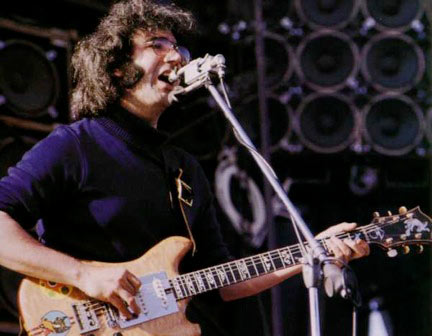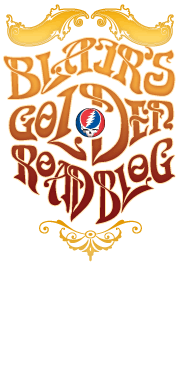I should be used to this by now and have a tougher skin. But I can't help myself. I was outraged when the latest issue of Rolling Stone arrived a few days ago with its cover story on the “100 Greatest Guitarists of All Time.” The list was compiled from picks by a truly diverse group of guitarists young and old— including Trey Anastasio, Ritchie Blackmore, Tom Morello, Robbie Krieger, the Black Keys' Dan Auerbach, Scotty Moore, Andy Summers and Carlos Santana, to name just a few of the more than 50—plus a handful of rock journalists and music industry folks. The article reveals nothing about the poll's methodology—how many guitarists the respondents could list, what criteria should be considered, etc. Are these “favorites”? “The best”? “Most influential”? Probably all those things, to varying degrees.
The #1 choice was no surprise—Jimi Hendrix, of course. And most of the other members of the Top Ten are names that have always placed high on these sorts of lists—and there have been a million of 'em—through the years: Eric Clapton, Jimmy Page, Keith Richards, Jeff Beck, B.B. King, Chuck Berry, Eddie Van Halen, Duane Allman and Pete Townshend. All fine guitarists. OK, Chuck Berry is on there for essentially inventing one riff (and several variations thereof)… but what a great and important riff it was!
Yet the glaring injustice in this top 100 is ranking Jerry Garcia as #46. Really? Below Johnny Ramone (#28)? Curtis Mayfield (#34)? Frickin' Randy Rhoads (#36; tragic death—always a good career move)? Bo Diddley (#27)? Cat had one riff he stole from Johnny Otis, and was not a good guitarist. But, yeah, influential for sure. Still, I'm not here to criticize other guitarists (though it sure is fun). I'm just sayin'…
Alas, Jerry is never going to get his props in these sorts of polls, just as Phil never fares well in Greatest Bassists surveys (how absurd!), nor Mickey and Bill in Greatest Drummers lists. (I would also argue that Weir is a better and more inventive player than most in Rolling Stone's 100, too, but I guess it's too much to expect people to appreciate the subtleties and intricacies of his playing. After all, he's “just” a rhythm guitarist, right? Wrong!) The sad fact is that all the members of the Grateful Dead—and the group itself—will always be underrated by people unable to look beyond the surface cliché: an acid-rock band that noodled endlessly and aimlessly during their five-hour concerts for an audience of stoned hippies. This common misconception can be the only reason why the Dead didn't make it into the Rock and Roll Hall of Fame during their first year of eligibility back in 1993. Can you imagine?
To enumerate Jerry's gifts as a guitarist here is preaching to the choir, I suppose. But let me just tick off a few salient points. No major rock guitarist ever traversed as many different styles and idioms as Garcia (no, not even Frank Zappa). He was comfortable playing blues, folk, jazz, country, free-form avant-garde, standards, bluegrass, Motown, Latin; you name it. Not only could he navigate through all those genres, he always sounded like himself when he did—the Garcia style is instantly recognizable and unique. He was a master improviser who, rather than automatically accepting conventional ideas about form and structure, constantly looked for opportunities to extend or escape those limitations. He took chances: His intoxicating spirit of adventure and musical fearlessness led him places that were often unexpected, weird, wonderful, beautiful, scary and just about any other adjective you can conjure. The landscape (and spacescape) he covered was unimaginably immense. He was the consummate ensemble player, sensitive to the musicians around him, but also not afraid to take charge and lead. At his best, his solos were masterful melodic constructions with brilliantly conceived tonal shadings and an indefinable—but clear—rhythmic logic that rivaled some of the greatest jazz musicians, from Django to Coltrane (both of whom he admired and studied). And the breadth and depth of his own songwriting and choices of songs to cover brought out so many emotions in his playing, that we, as fans, were privileged to accompany him on his remarkable musical journey that was at once intensely personal (for him and for us) yet somehow also drew us all together.
Do I have to disqualify myself from this argument because I'm a Dead Head? To the contrary, I'm a Dead Head in large part because of Garcia's guitar playing. I've always been a guitar guy. I worshipped at the altar of Hendrix and Clapton in the '60s, but also dug Cipollina, Jorma and Barry Melton. John McLaughlin and Duane Allman blew my mind in the early '70s, and my life was enriched by Neil Young, Ry Cooder, James Burton and so many others later in that decade. I've seen Lindsey Buckingham be God-for-a-night with Fleetwood Mac, and Bruce Springsteen tear it up like no one else can. I've been transported by The Edge, dug the primal growl of John Lee Hooker's axe and enjoyed the fluid perfection of Mike Campbell. No one riffs better than Keith Richards, and in his prime Stevie Ray was just about untouchable. Bonnie Raitt is still killing it on slide and Bill Frisell exudes an elegant simplicity I find very appealing. Is there anything Los Lobos' David Hidalgo can't do? Flashy or tasteful, electric or acoustic—I just love guitar.
But something about Garcia's playing spoke to me on a level that no other player ever has. Call it a soul connection, maybe. It's hard to communicate what that's like to others, but chances are you know what I'm talking about. Think about the opening of “Birdsong,” the quietest parts of “Stella Blue,” the roar of the climax of “Morning Dew,” the breezy lilt of a great “Eyes” solo, the dramatic ascension towards the end of “Slipknot!” or any number of other passages that sweep us up and carry us away. Perhaps he wasn't as influential as some other guitarists, but that's in part because he was a singular talent in what always was (and will be) a cult band.
That's why Jerry's not #46 on my list. I can honestly say he's #1, and no else is even close.

Jerry and his “Wolf” guitar, 1974.




